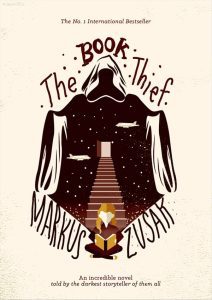Echoes of Guilt: The Book Thief Unveiled
Introduction
Embark on a literary journey as we unravel the intricacies of Markus Zusak’s poignant novel, ‘The Book Thief.’ Your guide through this emotional labyrinth is a seasoned bibliophile with a deep appreciation for the layers of guilt and redemption woven into the fabric of this historical masterpiece.
Unveiling the Tapestry of Guilt
At the core of ‘The Book Thief’ lies an exploration of guilt that resonates with readers on a profound level. It serves as the driving force behind characters’ actions, shaping the narrative’s emotional landscape. Whether it’s Liesel’s stolen moments with books or Hans Hubermann’s hidden kindness, guilt is an ever-present undercurrent, enriching the story with raw authenticity.
The Historical Tapestry: A Setting of Significance
Zusak’s choice of Nazi Germany as the backdrop is deliberate, adding a layer of historical significance to the narrative. The weight of guilt extends beyond personal struggles, intertwining with the collective guilt of a nation. The historical setting becomes a character in itself, influencing the choices and destinies of the protagonists.
Character Dynamics: Guilt as a Driving Force
Explore the multifaceted relationships between characters and guilt. Liesel’s stolen books, Max Vandenburg’s hidden identity, and even Death’s constant presence create a web of guilt that binds them. Each character’s journey is a testament to the transformative power of guilt, propelling them to confront their actions and find redemption.

Redemption Woven in Words: Zusak’s Literary Craftsmanship
Markus Zusak’s literary craftsmanship is a tapestry of words that elevates the novel beyond its historical context. His unique style, marked by Death as the narrator and poetic prose, amplifies the emotional impact of guilt and redemption. The choice of words becomes a cathartic experience, resonating with readers on a visceral level.
Connecting with Readers: Book Clubs and Emotional Resonance
Book clubs seeking narratives that stir emotions find ‘The Book Thief’ a compelling choice. The discussion-worthy themes of guilt and redemption, combined with the rich historical setting, provide ample material for engaging conversations. The novel’s emotional resonance ensures it lingers in the minds of book club members long after the final page.
Beyond the Pages: Impact on the Reader’s Soul
The impact of ‘The Book Thief’ transcends the boundaries of its pages. Readers are invited to introspect on their own relationship with guilt and redemption, mirroring the characters’ struggles. The emotional journey becomes a shared experience, leaving an indelible mark on the reader’s soul.
Informative Table: Key Points at a Glance
| Topic | Key Points |
|---|---|
| Unveiling Guilt | Central theme, its impact on characters |
| Historical Setting | Significance and influence on the narrative |
| Character Dynamics | Key characters and their relationship with guilt |
| Literary Craftsmanship | Zusak’s unique style and its thematic impact |
| Book Club Connection | Why ‘The Book Thief’ resonates with book clubs |
| Emotional Impact Beyond Pages | Lasting impressions on readers’ souls |
Comparative Table: Guilt vs. Redemption
| Aspect | Guilt | Redemption |
|---|---|---|
| Definition | A haunting burden | A path to liberation and renewal |
| Character Influence | Drives actions and decisions | Facilitates growth and positive transformation |
| Narrative Tone | Somber and reflective | Inspirational and hopeful |
| Reader’s Emotional Journey | Introspection and empathy | Catharsis and a sense of closure |
Conclusion
In the tapestry of ‘The Book Thief,’ guilt and redemption are threads that weave a story both haunting and uplifting. As you delve into Zusak’s world, let the echoes of guilt and the promise of redemption guide you through an emotional journey that transcends time and leaves an indelible mark on your literary soul.












